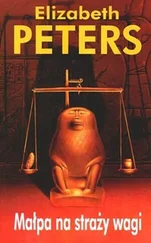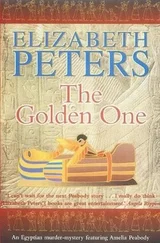The name of Emerson has now returned to the narrative; but the reader must not suppose that it was absent from our thoughts during the halcyon days of sailing. Evelyn did not refer to Walter, but when I introduced his name the eager light in her eye, the unguarded way in which she turned toward me told me that, though absent from her tongue, the name was not far from her thoughts.
As for myself, I thought often of Emerson, though not, of course, in the same way Evelyn regarded his young brother. No; the thought of Emerson was a stinging mosquito, which produced an itching spot that constantly demanded to be rubbed. (The Critic comments upon the inelegance of this comparison. I insist upon leaving it in.) Emerson's criticisms kept recurring to me; I saw evidence of neglect and vandalism to the monuments wherever we went, and I itched (you see the appropriateness of my analogy), I positively itched to be in charge of the entire antiquities department. I would have settled things properly!
We got to know some of our crew quite well. The cook was an elderly, toothless black gentleman from Assuan, who produced the most delicious meals upon two small charcoal burners. The waiters, Habib and Abdul, were handsome boys who might have stepped straight out of an ancient Egyptian painting, with their broad shoulders and long, slim bodies. We got to be very fond of them, especially Habib, who laughed in the most infectious manner whenever I spoke to him in Arabic. The crewmen I could only vaguely distinguish by their complexions, which ranged from black to cafe-au-lait; they looked identical otherwise, in their flowing striped robes and white turbans.
I acquired a new name during the voyage. The Egyptians have nicknames for everyone, and some of them are quite amusing and disrespectful. Maspero told us of a friend of his, an American gentleman named Wilbour, who is the proud possessor of a magnificent white beard. The Arabs call him "Father of the Beard." My name was equally descriptive; they called me the Sitt Hakim, the lady doctor. I felt I deserved the title; scarcely a day went by when I was not patching up some scrape or cut, although, to my regret, I was not called upon to amputate anything. When we stopped in the native villages I was always being approached by dark-eyed mothers, some no more than children themselves, carrying their pitiful babies. I had used virtually all my stock of eye medicines by the time we left Beni Hassan- and knew, unfortunately, that my efforts were like a single drop of water in a desert. The key to the regeneration of Egypt lies in the women. So long as they are forced into marriage and motherhood long before they are ready for such responsibilities- sold to the highest bidder like animals, untrained in even the rudiments of sanitation and housekeeping,, untaught, unassisted, and degraded- so long will the country fail to realize its potential. I determined that I would speak to Major Baring about this as soon as we returned to Cairo. I didn't suppose that the man had any notion of matters outside of his account books; men never do.
With such reflections and studies the days passed delightfully. Evelyn's companionship added immeasurably to my enjoyment. She was the perfect friend: sensitive to beauty, responsive to my moods and to the frequent distressing sights of poverty and disease; interested in learning all she could of the history that unrolled before us; cheerful; uncomplaining. I found myself dreading the spring. It would have been so pleasant to look forward to years of Evelyn's company; we could have lived like sisters, enjoying the domestic comforts of England, and traveling whenever we got bored with domesticity. But that was clearly not to be expected. Whether Evelyn yielded to her cousin's suit or not, she would certainly marry one day; and I rather believed that Lucas would prevail. He had every argument on his side. So I decided to enjoy the moment and forget about the future.
After Beni Hassan, the next site of interest to historians is near a village called Haggi Qandil. The region has a more famous name; it is sometimes called Tell-el-Amarna, and it was the city of the heretic king Khuenaten- if indeed he was a king, and not a queen in disguise, as some archaeologists have claimed. I had seen copies of the strange portraits of this monarch, and had to admit that his form bore more resemblance to the feminine than to the masculine.
Even more intriguing was the speculation on the religious beliefs of this peculiar personage. He had abandoned the worship of the old gods of Egypt and given his devotion to the sun, Aten. Did he worship only this god? Was he the first monotheist of whom history gives us a record? And what connection could there be between this supposed monotheism and the monotheism of the Hebrews? Moses was raised at the court of Egypt. Perhaps the elevated faith of Yahweh derived, ultimately, from the iconoclastic religion of an ancient Egyptian pharaoh!
Evelyn was rather shocked when I proposed this idea, and we had a pleasant little argument. I gave her a lecture on Khuenaten; she was always anxious to learn.
"He abandoned the royal city of Thebes," I explained, "and built a new capital dedicated to his god, on land that had never been contaminated by other worship. Herr Lepsius discovered some of the boundary inscriptions placed on the rocks around the city of Khuenaten. There are also tombs in the cliffs, rather interesting ones; the drawings are quite different in style from the usual tomb decorations. If the wind suits, I think a visit there might be profitable. What do you say?"
I was leafing through my copy of Brugsch's Geographical Dictionary (Heinrich Brugsch, the archaeologist, not his disreputable brother) as I spoke; but I watched Evelyn out of the comer of my eye, and saw the betraying color rise in her cheeks. She put down her pencil- she was quite a good little artist, and had made a number of nice sketches along the way- and gazed out across the river toward the cliffs.
"What is the name of the place, Amelia?"
I rifled busily through the pages of Brugsch.
"The ancient name of the place was-"
"The modern name is El Amarnah, is it not?"
"There are three villages on the spot, el-Till and el-Haggi Qandil and El-Amariah. A corruption of these names- "
"Yes, yes, I recall- I recall Walter speaking of it. That is where he and Mr. Emerson are working. You would have no reason to remember that, of course."
I decided that Evelyn was being sarcastic. She seldom allowed herself this luxury, so I overlooked it on this occasion.
"Is that so?" I said casually. "Well, I suppose there is no reason why we should necessarily encounter the Emersons. The site is large and the tombs are scattered. We will take it as settled, then. I will speak to Reis Hassan."
Owing to a difficulty with the wind, we did not reach the village of Haggi Qandil for two days. Indeed, we had some trouble reaching it at all; if I had not been determined, Reis Hassan would not have stopped. He mentioned unfavorable winds, disease in the village, the remoteness of the archaeological remains from the river, and a number of other irrelevant arguments. You would have thought the good captain would have learned by now the futility of arguing with me; but perhaps he enjoyed it. Honesty compels me to admit that Hassan may have had some reason on his side. We ran aground on a sandbank outside the village and had to be carried ashore by the villagers. We left Reis Hassan staring gloomily at his crew, who were trying to free the boat and making very little progress.
Michael, our dragoman, led the way into the village. It was a typical Egyptian village- perhaps a trifle more wretched than others. The narrow streets were heaped with refuse of all kinds, steaming under the hot sun. Dust and windblown sand coated every surface. Mangy dogs lay about the streets, their ribs showing. They bared their teeth at us as we passed, but were too miserable even to rise.
Читать дальше








